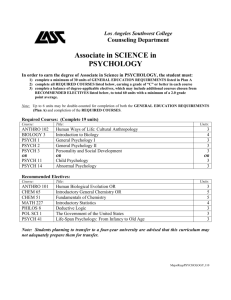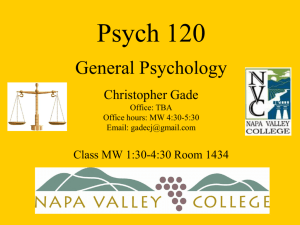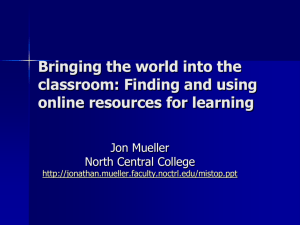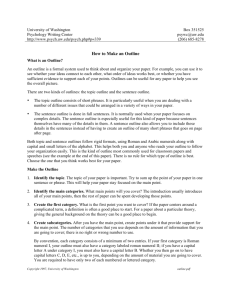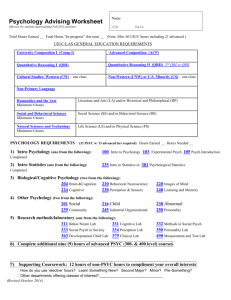What is the Hergest project and how would you
advertisement
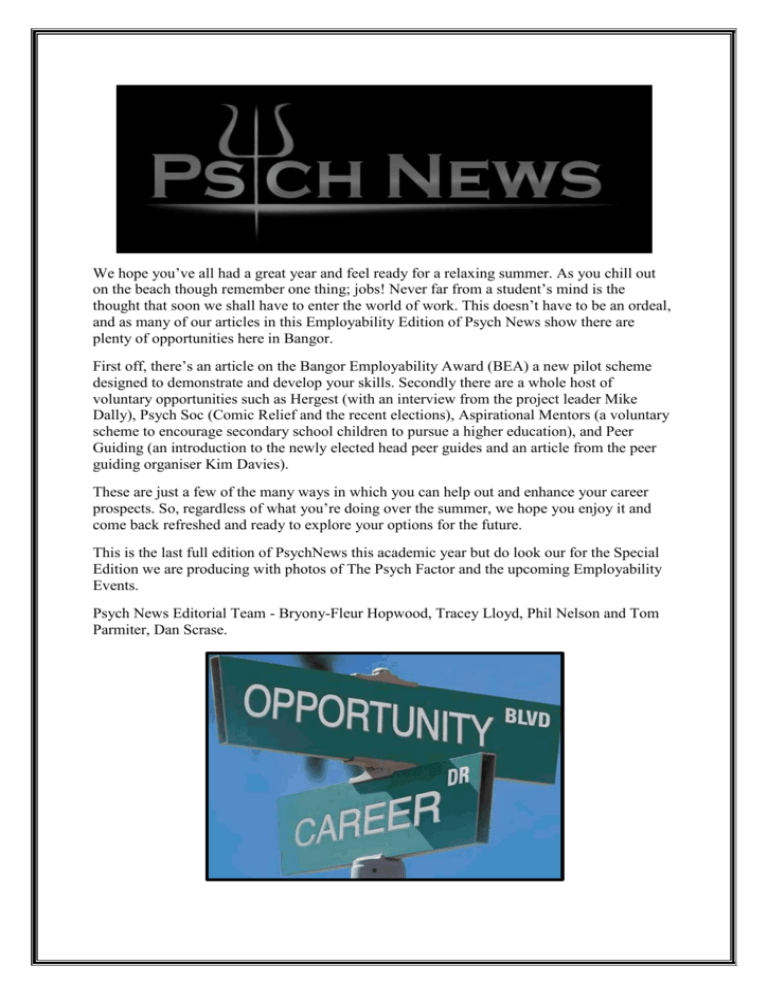
We hope you’ve all had a great year and feel ready for a relaxing summer. As you chill out on the beach though remember one thing; jobs! Never far from a student’s mind is the thought that soon we shall have to enter the world of work. This doesn’t have to be an ordeal, and as many of our articles in this Employability Edition of Psych News show there are plenty of opportunities here in Bangor. First off, there’s an article on the Bangor Employability Award (BEA) a new pilot scheme designed to demonstrate and develop your skills. Secondly there are a whole host of voluntary opportunities such as Hergest (with an interview from the project leader Mike Dally), Psych Soc (Comic Relief and the recent elections), Aspirational Mentors (a voluntary scheme to encourage secondary school children to pursue a higher education), and Peer Guiding (an introduction to the newly elected head peer guides and an article from the peer guiding organiser Kim Davies). These are just a few of the many ways in which you can help out and enhance your career prospects. So, regardless of what you’re doing over the summer, we hope you enjoy it and come back refreshed and ready to explore your options for the future. This is the last full edition of PsychNews this academic year but do look our for the Special Edition we are producing with photos of The Psych Factor and the upcoming Employability Events. Psych News Editorial Team - Bryony-Fleur Hopwood, Tracey Lloyd, Phil Nelson and Tom Parmiter, Dan Scrase. Bangor Employability Aw a r d - A n I n t e r v i e w w i t h Tr a c e y L l o y d In no more than 50 words what is the Bangor Employability Award? How can they get involved? Students who are not already enrolled need to speak to John Jackson, the BEA co-ordinator (email j.jackson@bangor.ac.uk, phone 01248 388424. Is it difficult to complete? The BEA is an award that runs alongside the degree programme. It will help employers to see the skills that students have gained in a simple and clear way by providing a certificate of achievement along with a transcript of skills. I guess that would depend on the types of activities that you are involved in already. If you do any form of work (paid or voluntary) and are a member of clubs and societies, then the award is relatively easy. What gave you the idea? Are there any disadvantages or side effects to taking part? This is an initiative from the University to encourage students to work on their employability skills as a response to the current economic climate. Who can do it? This year the scheme is being run as a pilot in the School of Psychology and in Computer Sciences. Years one and two can currently enrol in the programme. We will be reviewing this over the summer. Why should they do it? Why not? Most students already do some form of extracurricular activity and/or work. All psychology students are taught a range of skills during their degree. The BEA allows students to use these experiences to their advantage and provides certification of these skills. Really, why would you not do that? Psych News, April 2011 Not really, but as a tutor, I would have to advise students to make sure that they put the same effort into their academic work as they would into the BEA and to plan accordingly. Employers are looking for students with good grades AND good skills, so both parts need to be worked on. There are forms to fill in online and workshops to attend for the BEA so students need to factor these extra commitments into their academic schedule so as not to over-stretch themselves. Comic Relief 2011 Kevin Deyna-Jones Following the success of the fundraising week for Children In Need PSΨCH organised another fund-raiser for Comic Relief. The second ever Club Uno saw DJ Soc, Storm FM and the Stage Crew taking over Bar Uno to put on a night of awesome entertainment, which raised a staggering £894. Everyone who came to the Club Night was charged £2 on the door and students had a great night out and enjoyed celebrating St Paddy’s Day. Tom Parmiter, Josh Payne, David Farnsworth and Kevin Deyna-Jones were on the door and thanks go to them for their hard work. In addition to monies collected on the door, £120 was raised through the sale of red noses. Psych Factor brought together students and lecturers in an X-Factor style music night, raising over £800. (A further £50 has been donated from this newsletter to Comic Relief from proceeds from advertising). Kudos to Ruth Marsden, Fraser Bailey, the acts, judges, stagecrew, Steve Houlston and everyone who attended Psych Factor. It was a hilarious night and a great success! Look out for the upcoming Special Edition of PsychNews for photos. Psych Factor and the event’s judging panel Psych News, April 2011 BPS Wales Student Conference March 26th 2011 On Saturday March 26th at silly o’clock in the morning (6.20am to you), a party of intrepid Psychology students and two hardy staff members set off for Swansea Metropolitan University to present research at the BPS Wales Student Conference. We had planned to set off at 6am, but SOMEONE was late (I am not at liberty to reveal who this was, since “what goes on tour, stays on tour”). 18 year-three students (and one bus driver) chose to travel with Drs Lloyd and Short on board a very nice coach to the venue. One student wisely chose not to travel with us at all, and another asked her Dad to pick her up when she got there! On arriving in Swansea (LATE) we joined in with the conference and the students represented Bangor Psychology brilliantly well. All presented in a clear and professional manner (hurrah for POPPS) and their work was well received. Representatives from the BPS Wales committee met together and awarded prizes for the best presentations. Bangor Psychology won first prize this year and we are proud and pleased to announce that Kevin Deyna-Jones was the winning student with his presentation on Precision Teaching Methods. Having won a prize, we headed back to Bangor; tired, but proud of ourselves. A confidentiality agreement between those of us who went on tour at the weekend prevents me from revealing further details about the trip, but I have to ask the question “Are we nearly there yet, Fay?” Psych News, April 2011 Looking to Fresher’s Week… This year we would like to ensure that no Fresher is left behind by introducing new schemes for joint honours students and masters students to make sure they have the opportunity to get involved, too. These schemes are in the process of being constructed so we will be able to give more information closer to the time. Hello Psychology students, Our names are John Galvin and Rhiannon Edwards and we are your Head Peer Guides for the academic year 2011/2012! At the moment we are working with the Senior Peer Guides and the LRC staff to organise and structure everything, from arrival weekend to the events which we will be putting on during the week. We will be working closely with the Psychology Peer Guides throughout Welcome Week to ensure that everyone enjoys their first week at University and becomes familiar with the University life-style before semester one begins. It is also within our responsibilities to ensure that the Peer Guides and Senior Peer Guides have a good week and we aim to bring more advantages to being a Peer Guide than previously. This year we will focus on making sure the Peer Guide’s get the recognition they deserve for their hard work, for example, we will be giving awards for Psychology Peer Guide of the Year and Psychology Senior Peer Guide of the Year along with many other prizes. Psych News, April 2011 We hope that everyone will enjoy Welcome Week and get a lot out of it. We will endeavour to make this Welcome Week one to remember for both Peer Guides and first year students. We have numerous events that you will see advertised over the coming weeks. We are currently working with the Senior Peer Guides and the LRC staff to bring you the best Welcome Week to date! Welcome to Bangor-here’s your Peer Guide! Kim Davies Want a bit of a hand settling in? Worried about making friends? Don’t know where to find things? Don’t worry - find a Peer Guide You won’t be able to miss them in their bright shirts with the smiley man on the back Bangor is well known for the warm welcome it extends to its students and integral to that is our Peer Guide scheme. It has successfully helped our new students settle in for 15 years now and was recently shortlisted for a Times Higher Education Award. In September there will be over 70 Peer Guides in the School of Psychology. These are 2nd and 3rd year students who remember what it’s like to be a new student and have volunteered to give you a friendly hand settling in. And this happens right from the start when they are out and about greeting the new students as they arrive in the Halls of Residence and continues through Welcome Week and beyond. They’ll help you find your way about Bangor – both the town and the university - as well as organising different activities and social events where you’ll make lots of new friends. They’ll give you the low down on being a Psychology student here and will answer your questions about all those niggling little things that you might need help with o o o o o Where’s the lecture theatre? What are the lecturers like? Where can I play badminton? Where’s the launderette? …. and all the other things you don’t want to bother a member of staff with If they don’t know the answer or can’t help you themselves their training makes sure they will know someone who can. And after all that once you’re settled maybe you’ll want to become a Peer Guide yourself. It’s a great way to have fun and to develop some worthwhile employability skills. Psych News, April 2011 Headway Gwynedd is the local branch of a national brain injury charity that supports people with brain injuries and their loved ones. Its organisers, many of whom have first-hand experience with brain injury and post-injury care, hope to form close ties with Bangor’s psychology students by providing volunteering opportunities from which both students and Headway’s members can benefit. As Student Events Coordinator for Headway Gwynedd I’ll be organising a number of events over the next few months to raise funds and awareness. Money raised helps to pay for the charity’s regular support meetings and to provide transport for members to attend relevant educational events. Sharing experiences with other carers and sufferers can empower members with knowledge about injuries and in turn alleviate some of the distress and helplessness they often experience. Donations also help to mitigate the travel costs incurred when the loved ones of recently injured people find themselves needing to visit one of the few hospitals in the UK equipped to deal with severe brain injuries. My personal experience of volunteering with Headway Gwynedd has been immensely rewarding. Although members are extremely grateful to fundraisers, they are very excited just to see students take an interest in their cause; even minor volunteer involvement has a real and immediate impact. Unfortunately, due to overwhelming demand, we are currently unable to offer any places for students to come along to the support meetings directly. However we do need all the support we can get from students who want to help us as fundraisers and, if we can reach out to more people, then we can hopefully offer more places for more direct involvement in the future. Upcoming events that we’d love students to get involved with include a sponsored bag pack at Tesco planned for the 2nd of April and a walk up Cadair Idris in the second week of May (date to be confirmed) to promote National Brain Injury Awareness Week. We’re always looking out for new fundraising opportunities so if you have any ideas you’d like to share please email me at psuc40@bangor.ac.uk. Also email me if you’d just like to be put on our mailing list to be notified of upcoming events or are continuing your education at Bangor next year and would like to contribute then. Psych News, April 2011 Thanks, Alex Wojtowicz, Student Events Coordinator, Headway Gwynedd A Missing Crossword… Emily O’Neill Across 6. Type of attachment 1. One of the big five personality traits 7. Zimbardo’s prison experiment 4. A neurotransmitter 9. A general perspective 5. Famous for his dogs 12. A defence mechanism Psych News, April 2011 8. Part of the brain associated with emotions Down 10. Face blindness 2. An acceptable addictive drug 11. A disorder where sufferers may have problems with reading comprehension 3. Can help treat stress St David’s Day Bryony-Fleur Hopwood Here in Bangor, the city prides itself on being a well-established community that is proud to call itself Welsh. The Welsh patron saint St. David was known for bringing the people of Wales together and rather than having individual possessions he encouraged the community to share everything they had. St David’s day having just been celebrated on March 1st was recognised by the wearing of the daffodil (the national Welsh flower) or a leek (the national Welsh vegetable). Welsh flags are flown, singing, a national pastime, is common in schools on this day, and church services are held to honour the life of St. David. Many people eat cawl, a typical Welsh soup consisting of leek and other vegetables. Another local delicacy is bara brith, a delicious Welsh fruitcake. This year’s St. David’s day was celebrated by both the SU and the Welsh SU (UMCB) with a Welsh week from 28th February- 6th March involving a show of singing, dancing, music in Welsh. The Pontio programme (a range of events to precede the new arts and innovation centre currently being built) presented a Welsh comedy and music night, with Welsh food and beer. The grand finale was a Twmpath (Welsh folk dance) performed on the last night! This celebration is a key reminder that we are all part of a unique local culture that incorporates all incomers. There are many ways to get involved, whether it be at Serendipity, Psych Soc’s Siop Siarad or the UMCB’s many events and regular activities. Come along and learn a little about where you live. Psych News, April 2011 Hysteria-The Past Farce in Psychology Tom Parmiter Hysteria describes a state of unmanageable fear or emotional excess, which can result in violent emotional outbreaks and disturbances of sensory and motor functions. It was medically diagnosed, but solely to women, until 1952. Symptoms were vast and included fainting, insomnia, fluid retention, vaginal lubrication, voluptuous sensations and a general tendency to cause trouble. In a nutshell, hysterics were just women who were “too emotional.” Hysteria was first diagnosed around the 4th Century BC. Hippocrates said: “In the middle of the flanks of women lies the womb, a female viscus [organ], closely resembling an animal… in a word, it is altogether erratic. It delights, also, in fragrant smells, and advances towards them; and it has an aversion to fetid smells, and flees from them; and on the whole the womb is like an animal within an animal.” Bluntly put, if a lady’s libido was not satisfied, the animal that was her genitalia took over her mind and made her mad. This was a medical diagnosis that survived for well over 2000 years. But wait, it gets worse. The treatment for hysteria was as follows: intercourse (if married), marriage (if single) and, as a last resort, a physician’s vaginal massage. That’s correct. Hysteria was cured for well Psych News, April 2011 over 2000 years by making women orgasm. Physicians were solely qualified to provide this treatment, as masturbation would cause mania and death. It was not classed as a sexual act, but rather a medicinal treatment, much like a course of antibiotics. Hysteria was not caused by a woman’s need for sex, but rather their need for maternity. In the 1600s, hysteria was the most commonly diagnosed disease, second to fever. No temperature? You have hysteria! Well, if you’re female. In the 1800s, the criteria for hysteria covered 75 pages, described as an incomplete list. Virtually any ailment could fit the diagnosis. Due to the time treatment took, it was burdensome to physicians. Enterprising individuals took it upon themselves to aid the medicinal community. Inventions started to appear as home appliances treating hysteria. Around a decade before the electric iron and vacuum were invented, home vibrators were best sellers. The diagnosis of hysteria sharply declined at the start of the 20th century. Hysteria had previously been the default diagnosis, should other explanations not be forthcoming. As new diagnoses came to light providing alternate explanations, hysteria was less commonly diagnosed. Furthermore, hysteria was deemed an unacceptable diagnosis by the evermodernising society of the time. Fortunately, today we are moving towards a society that recognises these psychological illnesses for the life threatening illnesses that they actually are. The Hergest Project - An Interview with Mike Dally So guys, some of you may or may not heard of this wonderful voluntary opportunity. We interviewed Michael Dally (project leader) to give you the inside look on what it’s all about. What is the Hergest project and how would you describe it? For those who may not have heard about it, The Hergest Unit is an acute adult mental health facility based at Ysbyty Gwynedd hospital. It is run by Student Volunteering Bangor (SVB) and sends two groups of volunteers to the unit, one on a Monday night and one on a Wednesday night, on these evenings volunteers socialize with the service users through a variety of activities. What kind of activities do you run week to week? We have a full size snooker table and a pool table along with a new badminton set (rackets, shuttlecocks and net), table tennis, karaoke and DVD player. Even though we have these each week we try and keep it fresh by coming up with new, fun and original ideas. In the past we have made popcorn and hotdogs, and provided crisps, dips and fizzy pop for a movie night. We have made hundreds of pancakes, Welsh Cakes, soup and even fortune cookies for Chinese new year. What is the profile of a typical service user? Every service user is different in many respects and therefore each week is a whole new experience. Conditions vary, including problems due to alcoholism and / or drug abuse, self harm to delusions and schizophrenia. Psych News, April 2011 The Hergest Unit What do you look for in recruits? Enthusiasm, good social skills and a creative flair always bode well at The Hergest Project, as it can be quite demanding at times. What are the advantages and disadvantages of this position? The advantages to volunteering at The Hergest Unit are gaining hands on experience in an acute mental health ward and, from what I personally have noticed amongst our volunteers, a huge boost in confidence. Disadvantages could be that it can be extremely demanding at times and while we want everyone to have a good time it’s not always fun and games. We don’t want people to forget that it is an acute mental health unit and there are some very sad stories there so, in my opinion, it’s not for the faint hearted. What is the most rewarding part of your volunteer work? There are so many to choose from; seeing how well every single one of them are doing and the progress that they have made, the feedback we get from service users, hearing how much they enjoyed the food we have cooked or just our company in general makes it all so worthwhile. What got you interested in mental health work? There is a history of alcoholism and self-harm in my family so mental health is quite close to home for me. When I heard about The Hergest Project and the work that the volunteers do there I knew it would be right up my street and got involved straight away. What advice would you give to someone who wants to work in the mental health field? I would suggest gaining as much experience as possible while you are at university. Through my time as a volunteer and now project leader I have seen people come to realize that clinical health is a very competitive field and this experience would help them stand out in Psych News, April 2011 the crowd. Previous volunteers have gained paid work in various mental health facilities over others because they have had this experience. Cheers, Michael Dally Monday night project leader with Marina Simeou Optimism, Pessimism and Realism – Employment for the present If you have ever interviewed for a job, you’ll know that the interview does not end with a list of your qualifications. In today’s world employers want more than just a degree; they want a well rounded, experienced individual. Thankfully that is just what today’s higher education provides – in abundance. Of course, that’s not the whole story, the desire for more and more skills is not wholly the natural progression it appears to be – it’s not that we have moved on, it’s that we are being pushed, for better or worse by an intrusive government, their best intentions are paving the road to hell and forcing more graduates into a market, where there is no way to differentiate them from each other. This is not all the doom and gloom it sounds, if you are just starting your university life, or just fishing, it, then you could always benefit from giving your CV a little boost with some extra-curricular activity, “But how?” is the clarion call of the average student. Yes, you are urged to volunteer, to “get involved”, but to some people this is just too vague. Questions bubble to the surface; “Does it have to be relevant to psychology?” or “Does it have to be relevant to my future career?” and the answer, in my opinion, is no. The point of extra experience, to me, is not to get skills in a certain vocation – such as as a psychologist’s assistant – but it is rather to learn the ever elusive “transferable skills”. What are transferable skills? They are skills you can use across a multitude of disciplines, skills such as; organisation, delegation, communication, human relations and many more. So how does one go about gathering this experience? Well here at Bangor, volunteering is big. We have opportunities for everyone, no matter how much or how little they want to get involved. This, however, begs the question; why? Never before in history has volunteering and “extra experience” been so essential to getting a job – how far will such a trend go? Will it eventually become necessary to have 100 hours of voluntary work? 200 hours? Who knows? Well do not despair; water has a way of finding its own level. As too will the higher education market, the role of which is ever evolving and shows no sign of stopping – yes employability is a different ball game today, than it was just a generation ago but there is plenty to suggest that in ten years the employment landscape will look entirely different, and so the requirements for employment too will have changed. By Philip Nelson Psych News, April 2011 Pancake Day Pip Winstone Wheldon lounge was a-buzz with activity this Shrove Tuesday (that's Pancake Day to the uninitiated) as students were given the opportunity to take part in a whole host of pancake-related activities. Students were offered the chance to win a discount voucher for the new Creperie that opened last year in upper Bangor. To win this prize, students had to decorate a pancake to look as much like a brain as possible! The entries were judged by none other than our lovely Fay Short who was only too happy to help out; congratulations to Matt Everett for winning that competition. Another fun event that took place was a pancake tossing competition, won by none other than Johnny Lyden with an impressive 86 flips in a minute! Finally students had the chance to purchase a pancake for only 50p with a selection of toppings! All profits where put towards Comic Relief. I would like to thank Sammie Wheable, Rachel McShane, Nikolaj Jensen and Laurence Lundgren for their help on the day and special thanks goes out to the staff for the loan of their microwave! I think it is safe to say a great time was had by all. PsΨch Elections Dan Scrase On the 14th March Psych Soc held their AGM. The former committee (consisting of Kevin Deyna-Jones, Dan Scrase, Phil Nelson, Adrian Tan and Corina Wan) stood down to allow the new committee to be elected. Tracey Lloyd (academic liason) thanked the previous committee for their hard work and dedication during the previous year. Kevin and L-J reaffirmed this, with L-J adding her hopes and aspirations for the new year. L-J Stokes was automatically elected as Chair in agreement with the constitution (thankfully no one declared a vote of no confidence!). Members were then given a choice of candidates who all gave short speeches giving reasons why they should be elected. Following is a breakdown of the positions, candidates and votes received on the night. Vice Chair - Pip Winstone (47), Matt Everett (31), re-election (one). Academic Coordinator - Dan Scrase (23), Bethany Miles (21), re-election (three). Social Coordinator - Tom Parmiter (48), re-election (none). Treasurer - Laurence Lundgren (44), re-election (four). Secretary - Vicky Goodwin (37), re-election (nine). Congratulations to the new committee and good luck with your next year of office! Psych News, April 2011 Psych News, April 2011


